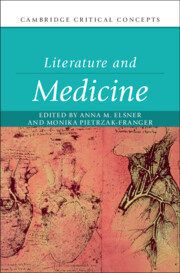Book contents
- Literature and Medicine
- Cambridge Critical Concepts
- Literature and Medicine
- Copyright page
- Dedication
- Contents
- Figures
- Contributors
- Acknowledgements
- Medico-Literary Pathways, Crossroads, and Side Streets
- Part I Origins: Histories
- Part II Developments: Forms
- Part III Applications: Politics
- Chapter 15 Malaria Literature
- Chapter 16 Forgotten Class
- Chapter 17 The Human Endeavour
- Chapter 18 Re-framing and Re-forming Disability and Literature
- Chapter 19 Overcoming Decline (in) Narrative
- Chapter 20 Literature as a Form of Care?
- Chapter 21 Literature in Collaboration
- Afterword
- Index
Chapter 15 - Malaria Literature
(Post)Colonial Perspectives, Infection, and the Question of Mobility
from Part III - Applications: Politics
Published online by Cambridge University Press: 17 January 2024
- Literature and Medicine
- Cambridge Critical Concepts
- Literature and Medicine
- Copyright page
- Dedication
- Contents
- Figures
- Contributors
- Acknowledgements
- Medico-Literary Pathways, Crossroads, and Side Streets
- Part I Origins: Histories
- Part II Developments: Forms
- Part III Applications: Politics
- Chapter 15 Malaria Literature
- Chapter 16 Forgotten Class
- Chapter 17 The Human Endeavour
- Chapter 18 Re-framing and Re-forming Disability and Literature
- Chapter 19 Overcoming Decline (in) Narrative
- Chapter 20 Literature as a Form of Care?
- Chapter 21 Literature in Collaboration
- Afterword
- Index
Summary
This chapter examines how Bengali authors of the late nineteenth and early twentieth centuries use the mosquito to experiment with scale in fiction and poetry. Authors such as Rabindranāth Tagore, Trailokyanāth Mukhopadhyay, Annadāshankar Ray, and Tārāshankar Bandyopadhyāy question both Western medical perception and Western concepts of literary realism by stressing how malaria and mosquitoes escape neat categorizations of meaning. Furthermore, the mosquito in works of poetry and fantasy also shows the interconnection of medical, political, and environmental issues. This chapter uses postcolonial criticism, medical history, and methods drawn from the Health Humanities in order to engage the poetics and politics of Bengali literary interpretations of malaria. By so doing, it stresses the importance of non-Western perspectives to the study of literature and medicine, suggesting that scholarship engage the multiple medical value systems as well as literary traditions that reinterpret and subvert Western tenets of scientific thought.
Keywords
- Type
- Chapter
- Information
- Literature and Medicine , pp. 263 - 280Publisher: Cambridge University PressPrint publication year: 2024



